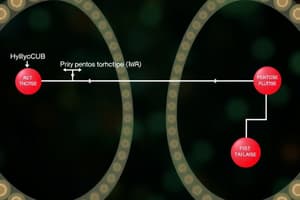Podcast
Questions and Answers
What distinguishes the nonoxidative phase from the oxidative phase in the pentose phosphate pathway?
What distinguishes the nonoxidative phase from the oxidative phase in the pentose phosphate pathway?
- It occurs exclusively in mitochondrial cells.
- It operates independently and requires multiple substrate molecules. (correct)
- It produces multiple pentose phosphates from one hexose phosphate.
- It only processes glucose molecules.
Which of the following processes would lead to increased flux through both the oxidative and nonoxidative phases of the pentose phosphate pathway?
Which of the following processes would lead to increased flux through both the oxidative and nonoxidative phases of the pentose phosphate pathway?
- Increased DNA replication (correct)
- Increased nucleotide synthesis
- Increased fatty acid synthesis
- Increased gene transcription
How can the stoichiometry of the overall reaction in the nonoxidative phase be summarized?
How can the stoichiometry of the overall reaction in the nonoxidative phase be summarized?
- 5 hexose phosphates yield 8 pentose phosphates.
- 5 hexose phosphates yield 6 pentose phosphates. (correct)
- 5 hexose phosphates yield 3 pentose phosphates.
- 5 hexose phosphates yield 5 pentose phosphates.
What misconception is commonly held regarding the nonoxidative phase of the pentose phosphate pathway?
What misconception is commonly held regarding the nonoxidative phase of the pentose phosphate pathway?
Which of the following statements about the oxidative phase of the pentose phosphate pathway is true?
Which of the following statements about the oxidative phase of the pentose phosphate pathway is true?
What is produced during the oxidative phase of the pentose phosphate pathway?
What is produced during the oxidative phase of the pentose phosphate pathway?
What is the role of glucose-6-phosphate dehydrogenase (G6PD) in the oxidative phase?
What is the role of glucose-6-phosphate dehydrogenase (G6PD) in the oxidative phase?
How does the nonoxidative phase of the pentose phosphate pathway differ from the oxidative phase?
How does the nonoxidative phase of the pentose phosphate pathway differ from the oxidative phase?
Which substrate molecule enters the oxidative phase of the pentose phosphate pathway?
Which substrate molecule enters the oxidative phase of the pentose phosphate pathway?
What type of reactions characterize the nonoxidative phase of the pentose phosphate pathway?
What type of reactions characterize the nonoxidative phase of the pentose phosphate pathway?
Which coenzyme is used by glucose-6-phosphate dehydrogenase in the oxidative phase?
Which coenzyme is used by glucose-6-phosphate dehydrogenase in the oxidative phase?
What is a key outcome of the pentose phosphate pathway?
What is a key outcome of the pentose phosphate pathway?
In what aspect does the oxidative phase of the pentose phosphate pathway contribute to cellular metabolism?
In what aspect does the oxidative phase of the pentose phosphate pathway contribute to cellular metabolism?
Which process would lead to increased flux through the nonoxidative phase of the pentose phosphate pathway?
Which process would lead to increased flux through the nonoxidative phase of the pentose phosphate pathway?
How many hexose phosphates are required to produce six pentose phosphates in the nonoxidative phase?
How many hexose phosphates are required to produce six pentose phosphates in the nonoxidative phase?
Which of the following processes does NOT require NADPH?
Which of the following processes does NOT require NADPH?
The misconception about the nonoxidative phase states that it operates solely as a continuation of which phase?
The misconception about the nonoxidative phase states that it operates solely as a continuation of which phase?
Which scenario would result in increased flux through the oxidative phase of the pentose phosphate pathway?
Which scenario would result in increased flux through the oxidative phase of the pentose phosphate pathway?
What type of molecules are produced in the oxidative phase of the pentose phosphate pathway?
What type of molecules are produced in the oxidative phase of the pentose phosphate pathway?
Which enzyme is primarily responsible for the first irreversible step of the oxidative phase?
Which enzyme is primarily responsible for the first irreversible step of the oxidative phase?
What happens to glucose 6-phosphate during the oxidative phase of the pentose phosphate pathway?
What happens to glucose 6-phosphate during the oxidative phase of the pentose phosphate pathway?
How does the nonoxidative phase of the pentose phosphate pathway primarily differ from the oxidative phase?
How does the nonoxidative phase of the pentose phosphate pathway primarily differ from the oxidative phase?
Which molecule serves as the substrate for the oxidative phase of the pentose phosphate pathway?
Which molecule serves as the substrate for the oxidative phase of the pentose phosphate pathway?
What is one of the key reducing agents produced by the pentose phosphate pathway?
What is one of the key reducing agents produced by the pentose phosphate pathway?
During the oxidative phase, what happens to the mass of molecules as a result of the reactions?
During the oxidative phase, what happens to the mass of molecules as a result of the reactions?
What is a function of the pentose phosphate pathway besides producing NADPH?
What is a function of the pentose phosphate pathway besides producing NADPH?
Flashcards
Nonoxidative Phase
Nonoxidative Phase
A sequence of reactions in the pentose phosphate pathway that does not involve oxidation. It can operate independently of the oxidative phase, and its primary function is to produce pentose phosphates, crucial for nucleotide biosynthesis.
Glycolysis
Glycolysis
The breakdown of glucose into pyruvate, generating energy in the form of ATP and reducing equivalents like NADH. It is a central metabolic pathway.
Pentose Phosphate Pathway
Pentose Phosphate Pathway
A metabolic pathway that generates NADPH and pentose phosphates, both crucial for biosynthesis and detoxification processes.
Nucleotide Biosynthesis
Nucleotide Biosynthesis
Signup and view all the flashcards
NADPH
NADPH
Signup and view all the flashcards
Oxidative Phase of Pentose Phosphate Pathway
Oxidative Phase of Pentose Phosphate Pathway
Signup and view all the flashcards
Nonoxidative Phase of Pentose Phosphate Pathway
Nonoxidative Phase of Pentose Phosphate Pathway
Signup and view all the flashcards
NADPH in Pentose Phosphate Pathway
NADPH in Pentose Phosphate Pathway
Signup and view all the flashcards
Glucose-6-phosphate Dehydrogenase (G6PD)
Glucose-6-phosphate Dehydrogenase (G6PD)
Signup and view all the flashcards
Pentose Phosphates
Pentose Phosphates
Signup and view all the flashcards
Relationship between Oxidative & Nonoxidative Phases
Relationship between Oxidative & Nonoxidative Phases
Signup and view all the flashcards
Rate-determining step of Pentose Phosphate Pathway
Rate-determining step of Pentose Phosphate Pathway
Signup and view all the flashcards
What is the role of the pentose phosphate pathway?
What is the role of the pentose phosphate pathway?
Signup and view all the flashcards
How many phases does the pentose phosphate pathway have?
How many phases does the pentose phosphate pathway have?
Signup and view all the flashcards
What are the main products of the oxidative phase?
What are the main products of the oxidative phase?
Signup and view all the flashcards
Which step in the pentose phosphate pathway is considered rate-determining?
Which step in the pentose phosphate pathway is considered rate-determining?
Signup and view all the flashcards
What is the primary function of the nonoxidative phase?
What is the primary function of the nonoxidative phase?
Signup and view all the flashcards
How can the oxidative and nonoxidative phases interact?
How can the oxidative and nonoxidative phases interact?
Signup and view all the flashcards
How does the pentose phosphate pathway relate to glycolysis?
How does the pentose phosphate pathway relate to glycolysis?
Signup and view all the flashcards
Why is the pentose phosphate pathway important?
Why is the pentose phosphate pathway important?
Signup and view all the flashcards
What is the nonoxidative phase of the pentose phosphate pathway?
What is the nonoxidative phase of the pentose phosphate pathway?
Signup and view all the flashcards
What is the oxidative phase of the pentose phosphate pathway?
What is the oxidative phase of the pentose phosphate pathway?
Signup and view all the flashcards
What is the relationship between the oxidative and nonoxidative phases of the pentose phosphate pathway?
What is the relationship between the oxidative and nonoxidative phases of the pentose phosphate pathway?
Signup and view all the flashcards
Explain the metabolic needs of DNA replication, gene transcription, and fatty acid synthesis.
Explain the metabolic needs of DNA replication, gene transcription, and fatty acid synthesis.
Signup and view all the flashcards
What is the stoichiometry of the nonoxidative phase of the pentose phosphate pathway?
What is the stoichiometry of the nonoxidative phase of the pentose phosphate pathway?
Signup and view all the flashcards
Study Notes
Pentose Phosphate Pathway (PPP) Introduction
- The PPP, also called the hexose monophosphate shunt, modifies glycolysis intermediates to convert glucose into pentose phosphates.
- Pentose phosphates are crucial for forming nucleotides and nucleosides.
- NADPH, a byproduct, acts as a reducing agent within the cell, protecting against oxidative damage and involved in lipid synthesis.
- The pathway has two interconnected phases, either operating independently or sequentially.
PPP Phases
- The two phases of the PPP—oxidative and nonoxidative—have different functions.
- The oxidative phase is irreversible and produces NADPH, CO2, and a pentose phosphate (ribulose-5-phosphate).
- The nonoxidative phase is reversible and transforms pentose phosphates among themselves using transketolase and transaldolase to interconvert pentose phosphates into other sugars such as fructose 6-phosphate or glyceraldehyde 3-phosphate, which can be used for glycolysis.
- This phase allows for the production of pentose phosphates without NADPH production, offering cellular flexibility.
Oxidative Phase
- Glucose 6-phosphate is the initial substrate.
- Glucose-6-phosphate dehydrogenase (G6PD) catalyzes the initial, rate-limiting step, converting glucose-6-phosphate to 6-phosphoglucono-delta-lactone.
- The next step, by 6-phosphogluconolactonase, hydrolyzes the lactone to 6-phosphogluconate.
- The final step, catalyzed by 6-phosphogluconate dehydrogenase, produces ribulose-5-phosphate, NADPH, and CO2.
- This phase is irreversible.
- NADPH production in the oxidative phase is crucial for protecting cells from oxidative damage and is used in lipid synthesis.
Nonoxidative Phase
- The nonoxidative reactions are reversible.
- Intermediates produced by G6PD can be used for reactions in the nonoxidative phase.
- The enzymes transketolase and transaldolase play key roles in converting pentose phosphates into other sugars. This phase interconverts pentose phosphates, ribose-5-phosphate, and xylulose 5-phosphate with flexibility.
- The nonoxidative phase can also produce pentose phosphates needed for nucleotide synthesis without NADPH production.
- The nonoxidative phase allows for the conversion of pentose phosphates into other sugars like fructose 6-phosphate and glyceraldehyde 3-phosphate, which can re-enter glycolysis.
Overall Function
- The PPP produces pentose phosphates, essential for nucleotide synthesis.
- It also produces NADPH, a crucial reducing agent for protecting cells from oxidative damage and in lipid synthesis.
- The two phases provide metabolic flexibility to produce pentose phosphates, and NADPH.
- Deficiency in G6PD results in less NADPH production, hindering protection from oxidative damage, and leading to hemolytic anemia.
Studying That Suits You
Use AI to generate personalized quizzes and flashcards to suit your learning preferences.




